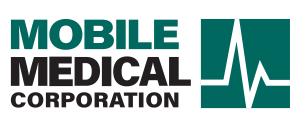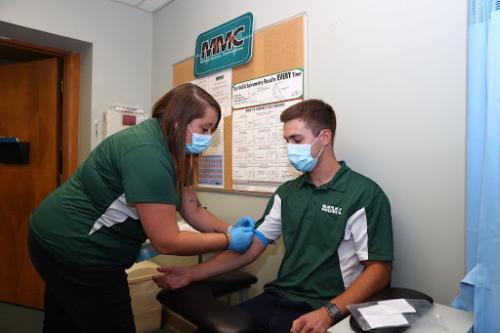Most employers would agree that a healthy workforce is a happy workforce. Having healthy employees can be an asset to your company and may produce better quality work. Employee health screenings are a great way for employers to prioritize those who contribute to making the company successful. These screenings and physical exams can help prevent diseases or illnesses through frequent health evaluations. Not to mention that having a healthy labor force provides a boost in overall morale.
Employee health screenings are also an important aspect of workplace wellness programs, supporting the overall health and productivity of your team. Because these screenings are beneficial to the personal lives and well-being of your workforce, they can create a sense of care and attention for your employees.
What is Employee Health Screening?
Similar to regular or yearly check-ups, employee health screenings are used to assess the well-being and health risks of your staff. During one of these screenings, medical professionals will offer tests and various occupational health services that are no different than what you would find at a doctor's office. Screenings often include a review of health history and risk factors to better evaluate current and future health concerns.
For example, you may find blood glucose tests and blood pressure monitoring to be commonly included in health screenings at work. These screenings can help detect chronic diseases early, supporting both prevention and timely intervention. Employee health checkups are an important part of routine workplace health assessments, promoting employee wellbeing and organizational productivity. Screenings may be tailored based on the job role and its specific requirements to ensure workplace safety and suitability.
Mobile Medical Corporation provides your organization with convenience: on-site mobile medical services clinics that offer similar medical services for your workplace. We provide health management services for common chronic illnesses and general occupational-related issues. Our screenings cover a wide range of health assessments to address diverse employee needs.
Types of Employee Health Screening Tests
Drug and Alcohol Testing
Drug and alcohol tests are a key component of employee health screenings. Substance abuse is, unfortunately, a very common issue within workplaces today. This doesn't just decrease productivity, but it also greatly affects the personal lives and well-being of your employees. Routine drug and alcohol testing can reduce the habitual use of addictive substances.
Mobile Medical Corporation proudly offers customized workplace drug testing solutions.
Heart Health Tests
Blood pressure monitoring, blood glucose levels, and cholesterol tests are all common facets of heart health assessments that are included in employee screenings. Determining factors that lead to poor heart health through screenings may require an employee to make changes to their lifestyle, as that's the most common reason heart issues develop in adults.
Physical and Mental Health Checkups
Most people are aware that physical health needs to be prioritized; however, in recent years, workplaces have been putting a greater emphasis on mental health. Routine checkups for both physical and mental health can help catch problems before they fully manifest in an employee. This helps identify potential health issues before they become serious and reduces the probability of severely poor health in the future.
Biological Monitoring
For work environments where exposure to toxic or hazardous chemicals is common, biological monitoring may be needed to help identify potential risks associated with such exposures. Biological monitoring can help employers keep their workers safe and avoid potential illnesses.
Mobile Medical Corporation's blood monitoring services collect samples that are then sent over to an OSHA-certified laboratory for analysis.
Hearing Tests
Hearing tests are essential, especially for those working in environments with high noise levels or in roles where sharp hearing is critical. These assessments evaluate an employee's ability to detect sounds across various frequencies and volumes, helping to identify early signs of hearing loss or other auditory issues. Including hearing tests in your health screenings not only helps protect employees from potential hearing-related health issues, but also contributes to a safer workplace by reducing the risk of accidents caused by impaired hearing.
Implementing an Employee Health Screening Program
Implementing a health screening program involves thoughtful planning and collaboration. Employers should begin by identifying the specific health risks and concerns relevant to their workforce and industry. This process includes conducting a thorough health assessment, analyzing occupational health data, and consulting with occupational health professionals to determine the most appropriate screenings.
A comprehensive health screening program should offer a variety of assessments, such as physical exams, blood tests, and mental health evaluations, tailored to the needs of your employees. Providing follow-up care and support ensures that employees receive the guidance they need to address any health concerns identified during screenings. By taking these steps, employers can improve employee health, lower healthcare costs, and create a healthier, more supportive work environment.
Best Practices for Employee Health Screenings
To maximize the benefits of health screenings, employers should follow best practices that ensure the program's effectiveness and sustainability:
- Set clear goals for your health screening program, such as improving employee health, reducing healthcare costs, and fostering a healthier workplace.
- Select evidence-based screenings and assessments that address the specific health risks faced by your workforce.
- Encourage employee participation by communicating the benefits of health screenings and ensuring confidentiality throughout the process.
- Provide follow-up care and resources to support employees in managing any health issues identified.
- Regularly evaluate the program's outcomes using health data and employee feedback, making adjustments as needed to enhance its impact.
By adhering to these best practices, employers can create a health screening program that delivers meaningful benefits for both employees and the organization.
Employee Privacy and Confidentiality
Employers must handle all health data collected during screenings with the utmost care, ensuring it is securely stored and only accessible to authorized personnel. Compliance with privacy laws and regulations, such as the Health Insurance Portability and Accountability Act (HIPAA), is essential to safeguard sensitive health information.
Establishing clear policies for maintaining confidentiality (including secure record storage, restricted access, and strict guidelines for sharing health information) helps build trust between employers and employees. Prioritizing privacy encourages greater participation in health screenings while supporting a successful, ethical health screening program.

What are the Benefits of Employee Health Screenings?
Investing in the well-being of your employees is always a good idea; however, there are many specific benefits of employee health screenings. These occupational health services are made to work in favor of your company's goals and employee satisfaction.
Reduced Insurance Rates
Employers can offer lower health insurance premiums when their workforce is healthier due to employee screening initiatives. Absenteeism, workers' compensation, and healthcare costs can all be reduced from these screenings, and save employers money in the long term.
Increased Productivity
When employees feel good, their productivity during the workday increases. Through regular checkups during health screenings, employees may have a better awareness of unhealthy lifestyle choices and make an effort to become healthier. Once the burdens from an unhealthy lifestyle are lifted, employees may feel more confident in their job positions.
Overall Jobsite Safety
By having a healthier workforce, you can also create a safer work environment. By performing routine drug and alcohol screenings, you can benefit the overall well-being of your employees while also ensuring that your workplace is compliant with health and safety regulations.
Improved Employee Relations
When you take the time and energy to implement occupational medical screenings, it makes employees feel as if you are investing in their well-being, because you are! This can also help you acquire new employees, who may feel a sense of worth from the company through these screenings.
Mobile Medical Corporation's Employee Health Screening Programs
Our medical surveillance programs are specifically tailored to enrich the health of on-site workers and help workforces comply with OSHA standards. Our medical surveillance programs also offer periodic examinations and assessments for workers who are frequently exposed to toxins or harmful chemicals.
The information gathered during these assessments is securely managed to maintain confidentiality and comply with privacy laws. Our testing and services are designed to catch health issues or harmful exposures before they develop into larger problems. These programs help employers stay compliant with legal guidelines and OSHA standards, reducing the risk of penalties and protecting employee privacy.
Learn More About MMC's Occupational Health Solutions
Mobile Medical Corporation provides mobile medical testing solutions and mobile medical services that increase the health and efficiency of your workplace. Our health screenings and medical surveillance programs can offer industry-specific solutions to many issues your workplace may be facing.



